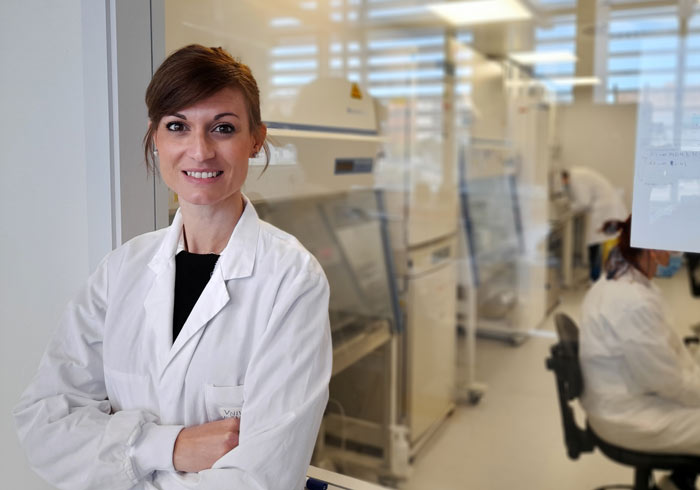
This December, Pilar Domingo-Calap has joined the Institute for Integrative Systems Biology I2SysBio (joint center University of Valencia-CSIC) as Ramon y Cajal Researcher and group leader.
Pilar Domingo-Calap is a biologist interested in the biomedical implications of viruses. She is graduated in Biology and M. Sc in Biodiversity by the Universitat de València (UV). During her PhD (2012, UV), she investigated the fitness effects of mutations in phages, and their influence on phage evolution. Her PhD training was extended with two internships at the Institut de Biologie Moléculaire et Cellulaire (CNRS, France), where she studied the mutation rate of HIV-1 co-funded by a European Research Council (ERC) Starting Grant (led by Rafael Sanjuán). Whereas her PhD was mainly focused on fundamental research topics, her interests shifted towards biomedicine during her postdoc. In 2013, she joined a Laboratoire d’Excelence from the Institut National de la Santé et de la Recherche Médicale (INSERM) at the Centre de Recherche d’Immunologie et Hématologie (Université de Strasbourg). Under the supervision of Seiamak Bahram, she started a new research line aimed at characterizing BK polyomavirus genetic diversity and immune escape in transplant recipients, using next-generation sequencing and epitope analysis. During this period, she also established several collaborations with physicians and clinical virologists to study polyomavirus genetics and immunity. In 2016, she joined I2SysBio with a ‘Juan de la Cierva Incorporación’ contract under the supervision of Sanjuán, extending her work on viral pathogenesis and immunity.
Domingo-Calap now joins the I2SysBio faculty as Ramón y Cajal researcher with her own group, The Environmental and Biomedical Viruses Lab. Her main research line, hunting viruses from the environment to be used in biomedicine, promotes phages as a promising alternative treatment against multidrug-resistant bacteria, allowing her to combine her expertise in phage biology and biomedicine. Phages are ubiquitous in the environment and immensely diverse, making phage discovery a powerful source of new therapies against pathogenic bacteria. She has been recently awarded with a ESCMID Research Grant 2020 to pursuit her research in phage therapy to combat Klebsiella pneumoniae, one of the high-risk infectious diseases due to the emergence of multidrug-resistant strains. She is member of the Spanish Phage Network (FAGOMA), the American Society for Microbiology, the Sociedad Española de Virología, and the ESCMID. Additionally, she has signed transfer agreements and established collaborations with national hospitals, which will allow her to directly explore phage therapy in the clinical setting, mainly as compassionate use. Recently, the SARS-CoV-2 pandemic has led her to conduct epidemiological surveillance studies of the virus through sewage and to study a possible indirect transmission route through the environment, being the PI of a FONDO-COVID19 grant (ISCIII), and several transfer contracts with private companies. Finally, it is worth to mention her teaching activities, mainly in Genetics, Evolution, Virology, and Phage Therapy at UV, Universidad Complutense de Madrid, Howest International University, Université Franche-Comté, and Université de Strasbourg.











